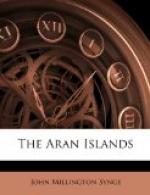The general ignorance of any precise hours in the day makes it impossible for the people to have regular meals.
They seem to eat together in the evening, and sometimes in the morning, a little after dawn, before they scatter for their work, but during the day they simply drink a cup of tea and eat a piece of bread, or some potatoes, whenever they are hungry.
For men who live in the open air they eat strangely little. Often when Michael has been out weeding potatoes for eight or nine hours without food, he comes in and eats a few slices of home-made bread, and then he is ready to go out with me and wander for hours about the island.
They use no animal food except a little bacon and salt fish. The old woman says she would be very ill if she ate fresh meat.
Some years ago, before tea, sugar, and flour had come into general use, salt fish was much more the staple article of diet than at present, and, I am told, skin diseases were very common, though they are now rare on the islands.
No one who has not lived for weeks among these grey clouds and seas can realise the joy with which the eye rests on the red dresses of the women, especially when a number of them are to be found together, as happened early this morning.
I heard that the young cattle were to be shipped for a fair on the mainland, which is to take place in a few days, and I went down on the pier, a little after dawn, to watch them.
The bay was shrouded in the greys of coming rain, yet the thinness of the cloud threw a silvery light on the sea, and an unusual depth of blue to the mountains of Connemara.
As I was going across the sandhills one dun-sailed hooker glided slowly out to begin her voyage, and another beat up to the pier. Troops of red cattle, driven mostly by the women, were coming up from several directions, forming, with the green of the long tract of grass that separates the sea from the rocks, a new unity of colour.
The pier itself was crowded with bullocks and a great number of the people. I noticed one extraordinary girl in the throng who seemed to exert an authority on all who came near her. Her curiously-formed nostrils and narrow chin gave her a witch-like expression, yet the beauty of her hair and skin made her singularly attractive.
When the empty hooker was made fast its deck was still many feet below the level of the pier, so the animals were slung down by a rope from the mast-head, with much struggling and confusion. Some of them made wild efforts to escape, nearly carrying their owners with them into the sea, but they were handled with wonderful dexterity, and there was no mishap.
When the open hold was filled with young cattle, packed as tightly as they could stand, the owners with their wives or sisters, who go with them to prevent extravagance in Galway, jumped down on the deck, and the voyage was begun. Immediately afterwards a rickety old hooker beat up with turf from Connemara, and while she was unlading all the men sat along the edge of the pier and made remarks upon the rottenness of her timber till the owners grew wild with rage.




